BMW 1 Series VS Ford Transit Transporter
BMW 1 Series
The BMW 1 Series stands out with its dynamic design that embodies both elegance and sportiness, making it an attractive choice for urban driving. Its interior offers a premium feel, combining quality materials with the latest in technological features to enhance comfort and connect drivers. Under the bonnet, a range of efficient engines ensures a responsive and enjoyable driving experience, balancing power with practicality.
more informationFord Transit Transporter
The Ford Transit Transporter has long been a staple in the commercial vehicle sector, renowned for its reliability and versatility. It offers a comfortable cabin with a modern design that enhances the driving experience, making long journeys more enjoyable. With a focus on practicality, the Transit provides ample cargo space, meeting the demands of businesses and individual users alike.
more information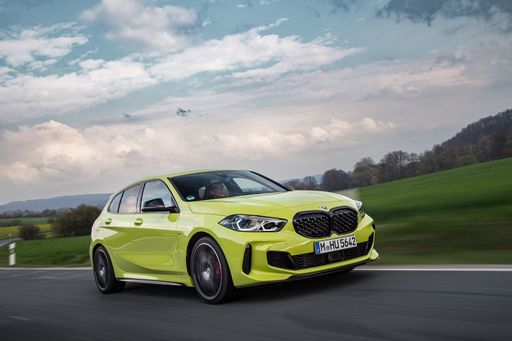 @ press.bmwgroup.com
@ press.bmwgroup.com
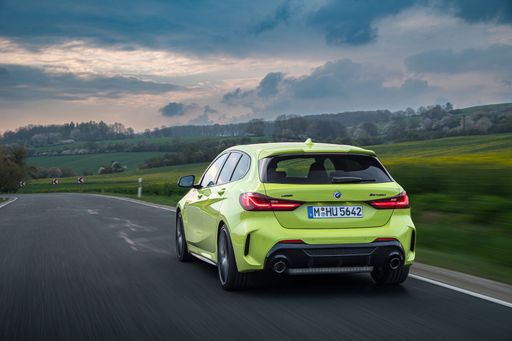 @ press.bmwgroup.com
@ press.bmwgroup.com
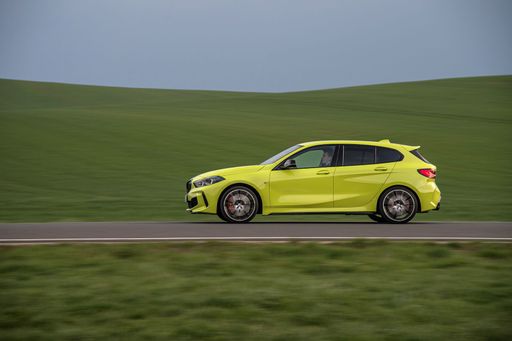 @ press.bmwgroup.com
@ press.bmwgroup.com
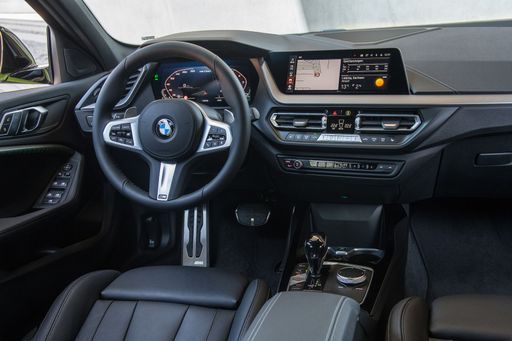 @ press.bmwgroup.com
@ press.bmwgroup.com
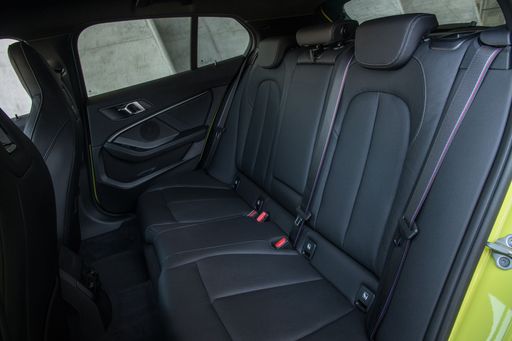 @ press.bmwgroup.com
@ press.bmwgroup.com
Costs and Consumption |
|
|---|---|
|
Price
about 28200 - 51000
£
|
Price
about 39900 - 69100
£
|
|
Consumption L/100km
4.3 - 7.6
L
|
Consumption L/100km
7.9 - 10.3
L
|
|
Consumption kWh/100km
-
|
Consumption kWh/100km
21.3 - 32
kWh
|
|
Electric Range
-
|
Electric Range
247 - 317
km
|
|
Battery Capacity
-
|
Battery Capacity
68
kWh
|
|
co2
112 - 173
g/km
|
co2
206, 208, 225, 244, 218, 238, 0, 268, 270
g/km
|
|
Fuel tank capacity
49
L
|
Fuel tank capacity
70
L
|
Dimensions and Body |
|
|
Body Type
Hatchback
|
Body Type
Cargo Van
|
|
Seats
5
|
Seats
3 - 6
|
|
Doors
5
|
Doors
4
|
|
Curb weight
1465 - 1625
kg
|
Curb weight
2074 - 2765
kg
|
|
Trunk capacity
300 - 380
L
|
Trunk capacity
-
|
|
Length
4361
mm
|
Length
5531 - 6704
mm
|
|
Width
1800
mm
|
Width
2059
mm
|
|
Height
1459
mm
|
Height
2530 - 2778
mm
|
|
Payload
475 - 510
kg
|
Payload
735 - 2607
kg
|
Engine and Performance |
|
|
Engine Type
Diesel, Petrol MHEV, Diesel MHEV, Petrol
|
Engine Type
Diesel, Electric
|
|
Transmission
Automatic
|
Transmission
Manuel, Automatic
|
|
Transmission Detail
Automat. Schaltgetriebe (Doppelkupplung)
|
Transmission Detail
Manual Gearbox, Automatic Gearbox, Reduction Gearbox
|
|
Drive Type
Front-Wheel Drive, All-Wheel Drive
|
Drive Type
Front-Wheel Drive, Rear-Wheel Drive, All-Wheel Drive
|
|
Power HP
122 - 300
HP
|
Power HP
105 - 269
HP
|
|
Acceleration 0-100km/h
4.9 - 9.8
s
|
Acceleration 0-100km/h
-
|
|
Max Speed
210 - 250
km/h
|
Max Speed
120
km/h
|
|
Torque
230 - 400
Nm
|
Torque
310 - 430
Nm
|
|
Number of Cylinders
3 - 4
|
Number of Cylinders
4
|
|
Power kW
90 - 221
kW
|
Power kW
77 - 198
kW
|
|
Engine capacity
1499 - 1998
cm3
|
Engine capacity
1995
cm3
|
|
Top speed
210 - 250
km/h
|
Top speed
120
km/h
|
General |
|
|
Model Year
2024
|
Model Year
2019 - 2024
|
|
CO2 Efficiency Class
D, C, F
|
CO2 Efficiency Class
G, A
|
|
Brand
BMW
|
Brand
Ford
|
BMW 1 Series
Exploring the BMW 1 Series: A Compact Powerhouse
The latest iteration of the BMW 1 Series continues to set the benchmark for premium compact cars, blending cutting-edge technology and efficient performance. Known for its sporty design and responsive driving dynamics, the BMW 1 Series offers a range of options that cater to varied preferences and needs. Let’s delve into the technical details and innovations that make this vehicle a standout in its class.
Advanced Engine Variants and Performance
Under the hood, the BMW 1 Series offers a varied selection of powertrains, including diesel, petrol mild-hybrid, and pure petrol options. Power outputs range from 150 to an impressive 300 PS, allowing drivers to opt for either efficiency or sheer performance. The utilisation of mild-hybrid technology in some variants ensures a smooth and efficient drive, with increased torque available for dynamic acceleration.
All models come equipped with an Automatic Transmission, more specifically, a double-clutch gearbox for seamless gear transitions, offering a responsive drive whether you're navigating city streets or the open road. The top-of-the-line M135 variant boasts all-wheel drive capability, enhancing traction and control even further.
Efficient and Sustainable Driving
The BMW 1 Series is engineered for efficiency, achieving fuel consumption as low as 4.3 litres per 100 km in some diesel variants, while the petrol models also demonstrate competitive efficiency ratings. In terms of emissions, the range offers CO2 output figures between 112 to 173 g/km, garnering respectable CO2-efficiency ratings. Additionally, the mild-hybrid variants benefit from regenerative braking, which captures energy usually lost during braking and uses it to power the vehicle.
Innovative Technology and Comfort
Step inside the BMW 1 Series and you'll find a driver-focused cockpit outfitted with the latest in automotive technology. The infotainment system is hosted on a high-resolution display, providing easy access to navigation, entertainment, and vehicle settings. Key features like smartphone integration and voice control enhance the connectivity options available, creating a seamless link between driver and machine.
On the comfort front, the BMW 1 Series provides a refined interior experience, with high-quality materials and finishes. There's generous space for up to five passengers, alongside a versatile boot capacity that ranges from 300 to 380 litres, accommodating both daily errands and weekend getaways.
Design and Dimensions
The exterior design of the BMW 1 Series showcases its sporty lineage with a compact and agile silhouette. Measuring 4361 mm in length and 1800 mm in width, it maintains a confident road stance, while its height of 1459 mm contributes to a sleek, aerodynamic profile. Furthermore, the 1 Series is available in several stylistic options, providing aesthetics that can be customised to personal preference, including M Sport packages that introduce more aggressive styling cues.
Conclusion: A Harmony of Performance and Comfort
The BMW 1 Series deftly balances performance, efficiency, and comfort, making it a compelling choice for those in the market for a premium compact car. With its range of powerful engines, state-of-the-art technology, and stylish design, the BMW 1 Series remains a leader in its segment. Whether you prioritise sporty performance or efficient urban commuting, the 1 Series is equipped to deliver beyond expectations.
Ford Transit Transporter
Discovering the Ford Transit Transporter: A Blend of Tradition and Innovation
The Ford Transit Transporter has long been a staple in the commercial vehicle market, known for its reliability and versatility. As Ford continues its innovative journey, the Transit Transporter integrates modern technology and eco-friendly advancements, making it more appealing than ever. Here, we explore some of its key technical details and innovations.
Under the Bonnet: Engine Variants and Efficiency
The Ford Transit Transporter offers a variety of engine options to cater to diverse commercial needs. Among these, the 2.0 EcoBlue Diesel engine provides a robust selection of power outputs, ranging from 105 to 165 PS. Not just limited to traditional fuel, Ford also introduces the E-Transit line with electric motors generating up to 269 PS. This transition to electric is an essential step towards sustainability, achieving an impressive range of 247 to 317 km on a full charge.
Fuel Economy and Environmental Impact
When it comes to fuel efficiency, the Transit Transporter presents a competitive edge with diesel variants consuming between 7.9 to 10.3 L/100km. On the electric side, consumption levels are measured at 21.3 to 32 kWh/100km. Furthermore, the Transit’s CO2 emissions range from zero for electric models to 270 g/km for select diesel engines, placing the vehicle in varying CO2 efficiency classes from G to A.
Performance and Driving Dynamics
Designed for optimal performance, the vehicle’s torque output ranges from 310 to 430 Nm, facilitating smooth and powerful driving experiences across various terrains. The Transit Transporter boasts a maximum speed of 120 km/h, ensuring timely commutes and deliveries, crucial for business efficacy.
The Versatility of Drivetrain Options
The Ford Transit Transporter provides an array of drivetrain configurations, including front-wheel, rear-wheel and all-wheel drive. This adaptability enables the vehicle to tackle different driving conditions with ease, offering stability and resilience no matter the challenge.
Technology and Innovation on Board
Ford’s commitment to innovation is evident within the Transit Transporter’s interior. Intuitive features such as advanced driver-assistance systems, smart connectivity tools, and ergonomic seating arrangements ensure that both driver and passengers enjoy a seamless and comfortable journey, ideal for long rides or daily routines.
Crafted for Practicality and Comfort
With length variations extending from 5531 mm to 6704 mm, and height options from 2530 mm to 2778 mm, the Ford Transit Transporter offers expansive cargo space and flexible seating arrangements. Depending on the variant, seating options range from 3 to 6 seats, catering to diverse passenger and cargo needs.
A Future-Ready, Cost-Effective Choice
Price tags for the Ford Transit Transporter range from €46,589 to €80,611, accommodating different budget requirements. With monthly operation costs calculated between €1430 and €1991, the Transit remains a financially viable option for businesses seeking reliability and efficiency.
Conclusion: An Unyielding Commitment to Excellence
The Ford Transit Transporter stands as a testament to Ford’s dedication to marrying tradition with progress. With its diverse range of powertrains, technological integrations, and practical design, it continues to lead the commercial vehicle segment, ready to meet the challenges of modern mobility and sustainability.
